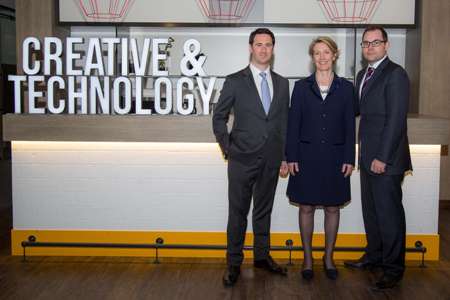 Leading businesses in the UAE are planning to increase their digital investment by 25% year-on-year, according to a study by Omobono Middle East, the strategic, creative and technology agency for global business brands.
Leading businesses in the UAE are planning to increase their digital investment by 25% year-on-year, according to a study by Omobono Middle East, the strategic, creative and technology agency for global business brands.
With a planned increase in digital investment, the study has also revealed that the UAE has realised the importance of digital, with 66% of respondents saying they are to increase their digital marketing budget over the next 12 months.
Speaking of the importance of the ‘What Works Where’ (WWW) study, Francesca Brosan, Co-Founder and Chairman of Omobono added, “Previous WWW results have proven that integrating digital communications within marketing programmes and the organisation in our data-driven, digitally led world, pays dividends – improving both effectiveness and efficiency for corporate brands. By combining sharp analysis of current digital activity in the UAE with deep understanding of global digital practice, we have produced a road map to help progressive businesses in the UAE to prosper with our innuagural #WWWUAE2017 study.”
Social Media Investment
Of that increased budget, 20% is to be invested in social media sites such as LinkedIn, Facebook, Twitter and YouTube. Indeed, LinkedIn is to be the biggest winner, with 97% of respondents set to allocate part of their B2B digital marketing budget to the business and employment-oriented social networking service. A further 88% are to allocate funds to Facebook and 69% to Twitter. YouTube is to receive increased investment from 56% of respondents.
LinkedIn is regarded as the most effective B2B channel for 43% of marketers, with Facebook allowing 40% of marketers to reach the widest possible audience.
While the majority of marketers expect to shift their spending priorities in 2017, the percentage to be invested in digital over the next 12 months is noticeably low compared with other markets such as the UK, where digital marketing budgets are to increase by 55% over the same period.
The commitment to digital progression is palpable but the research has also revealed that businesses lack the training to realise their ambitions, with several respondents commenting on the absence of suitable certified courses.
Changing Role of HR
In today’s integrated, multichannel commercial markets, HR is no longer merely the internal voice of the brand, but is rapidly becoming the representative voice of the company for external partners and audiences alike. The WWW 2016 (UK) study revealed that 75% of respondents agree HR’s digital practices contribute to the overall brand profile.
One striking finding from the research is that the employee channel is not yet being used as powerfully by businesses in the UAE as it is in other markets. Ensuring the organization is living the brand comes in as the lowest priority (at 19%) for marketers.
This is in stark contrast to our 2016 (UK) findings, where 28% of marketers surveyed saw increasing value in the channel. Nor are they particularly interested in using digital data to improve this situation. It is a current priority for only 1 in 6 respondents and only 3% identify motivating employees as a future priority.
This subtle shift in digital ownership – from marketing to HR – challenges traditional brand promotion and engagement, forcing many organisations to realise that a truly effective brand presence requires integrated conversations and marketing communications.
Digital cannot remain the responsibility of any single function, or team, but is a resource best involving and best utilised by all. It’s an issue spotted by 31% of respondents who identified aligning their activities with other departments in the organisation as one of their key challenges for the future.
The findings are part of Omobono’s globally renowned What Works Where (WWW) study which has been launched in the UAE for the first time this month.
The study, which was carried out in conjunction with Radius Global Market Research is the result of interviews conducted across 12 industry segments including Banking & Finance; Professional Services; Leisure; Transport; Consumer Electronics; Telecom and Automotive in the UAE. The study combines online, face-to-face and in-depth interviews and open-ended opinions from CMOs, marketing directors and digital marketing heads of leading companies within the UAE such as Du, Fujitsu and Noor Bank to name a few.
Speaking about the study, Hadley Newman, Managing Director at Omobono Middle East said, “ One of the key objectives of the study was to identify how UAE businesses are reaching, engaging and winning customers through digital communications; and understanding how marketers should be working with internal and external resources to drive competitive advantage.
Newman went on to add, “As with marketers the world over, the challenge is no longer about becoming an expert in all disciplines, but in how best to identify, bring together and manage the most qualified digital experts, resulting in teams ready to deliver proven excellence across the board. Something, which may lack immediacy right now, but that in our experience, will become central to the ambitions of any business within the UAE, especially those with further aspirations.”
An empirical look at the efficiency and effect of digital marketing in the business space, the annual WWW study has been produced for the past seven years across markets such as the UK, EU, USA, India and China, helping businesses bridge the gap between what is thought of as influential to what can be shown as truly persuasive within the digital marketing landscape.


